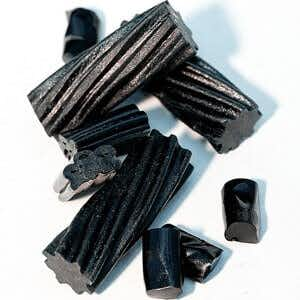
I am a licorice lover, I admit it. Black Australian Licorice from Kookaburra is quite good but I am especially fond of Gustaf’s Dutch Licorice CATS. There’s something about the texture and the taste that I love. But as much as I appreciate great licorice I am careful not to overdo and consume too much licorice at a time. This reader shares a scary story:
Q. In the last four months or so, my blood pressure began to climb higher and higher, despite my daily dose of the blood pressure medicine, lisinopril. In the last month, I began to feel short of breath and weak, my ankles swelled and I craved bananas.
My doctor started me on furosemide, Pravachol and atenolol, to no avail. My blood pressure yesterday afternoon while resting was 213/91, and today it was 193/93. I was afraid I would go into kidney failure or have a heart attack.
This afternoon your book (The People’s Pharmacy Guide to Home and Herbal Remedies) arrived. The first thing I looked up was licorice.
I had been eating licorice twists every day for months. Your book alerted me to the cause of my symptoms. I’ve sworn off licorice and am hoping that my blood pressure will now come down.
A. Too much licorice may indeed have contributed to your extremely high blood pressure. Now that you have stopped eating it, your blood pressure should begin to come down gradually as the active ingredient in licorice begins to dissipate from your body.
What’s in Licorice that Causes Mischief?
The ingredient that wreaks havoc with the body’s hormones and metabolism is hard to pronounce and nearly impossible to spell: glycyrrhizin (pronounced gliss-er-RIZZEN). It can affect the body in a variety of ways that most people who never anticipate.
Candy seems like an innocent treat, but too much licorice, whether in candy, as tea or in capsules, can raise blood pressure and lower levels of potassium. (Maybe that’s why you were craving bananas, which are a good source of potassium.)
Side effects from a high dose or prolonged use of licorice (months of candy counts) can be serious, resulting in fluid retention, weakness or heart rhythm irregularities in some cases. Such high blood pressure is indeed extremely dangerous and needs treatment if it doesn’t come down promptly. Getting to the cause of the problem and giving up licorice makes a great deal of sense.
What About Licorice as a Medicine?
You might be surprised to learn that licorice has been used to treat coughs, colds and other respiratory infections. A derivative, glycyrrhizinic acid, has been shown to have antibacterial and antiviral activity and to stimulate the immune system. Licorice has also been used for digestive disorders, including ulcers and indigestion. But the complications of prolonged use make licorice untenable as a medicine.
Enter an even more impossible-to-pronounce “medication” called deglycyrrhizinated licorice or DGL for short. This is licorice without much glycyrrhizin, the stuff that raises blood pressure, depletes potassium and causes so much metabolic mischief.
DGL to the rescue:
Sadly, there has been relatively little good research into the benefits of DGL. One study found that a DGL mouthwash worked well for treating aphthous ulcers (canker sores in the mouth).
Some animal and human studies suggest that DGL might counteract the stomach irritation and bleeding induced by aspirin.
Visitors to this website report that DGL can help overcome the rebound hyperacidity associated with stopping proton pump inhibitors (PPIs). Acid-suppressing drugs like esomeprazole (Nexium), lansoprazole (Prevacid) and omeprazole (Prilosec) can trigger prolonged bouts of heartburn if stopped suddenly. That’s where DGL and some other natural products come in:
JFR reports:
“I have been chewing DGL tablets for many years, not only for heartburn, but for digestion. It works immediately. My understanding is that consuming too much licorice that is not deglycyrrhizinated can increase blood pressure–thus the name DG before L for “licorice.” When I have acid reflux, due to a hiatal hernia, I immediately wash the acid down with water then quickly chew two DGL tablets.”
MDF shared this story about her mother:
“I was taking my mother off Nexium and putting her on DGL and Tums. A couple of weeks ago my mother had the opening at the bottom of her stomach dilated and the doctor said ‘whatever you are doing, it’s working.’ He said it looked better than it did over a year ago.
“I believe in DGL. It’s great stuff. If you are going off Nexium, consider taking DGL and you may not have all those horrible rebound side effects…perhaps a little, but not as much as others have and it could prevent ulcers.”
Of course any natural approach to PPI withdrawal should be supervised by a health professional. To help with that process we offer our Guide to Digestive Disorders with information about combining DGL together with ginger capsules, probiotics and persimmon-ginger tea.
An Alternative to Natural Licorice:
Not all licorice candy is flavored with natural licorice; some has only anise flavoring. When I am desperate for the taste of licorice but don’t want to get into trouble with glycyrrhizin I occasionally indulge in anise-flavored “licorice.” It never quite replaces my love for the real thing, though.
As for the person who asked the question at the top of the page, I am guessing that he was consuming too much licorice with glycyrrhizin, which led to dangerously high blood pressure, swollen ankles and weakness. People who are that sensitive to this effect must avoid natural licorice candy.
We are glad that our book was helpful in alerting him to the reason behind his hypertension. Learn about all our publications at this link. Share your own favorite brand of natural licorice candy in the comment section below…just in case I get the urge to try something new.
Article Revised 8/1/16

